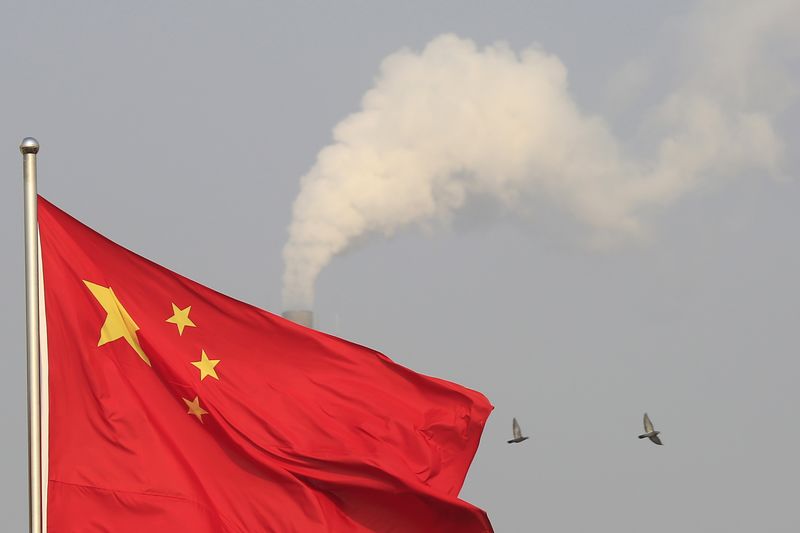 © Reuters.
© Reuters.
Investing.com -- China's economy grew at its slowest rate in nearly 30 years in the third quarter, and Boris Johnson is battling to get his Brexit deal through a recalcitrant House of Commons, while Saudi Arabia has postponed the IPO of national company Saudi Aramco - again. Here's what you need to know in financial markets on Friday, 18th October.
1. China grows more slowly than expected
The Chinese economy grew at its slowest rate in nearly 30 years in the third quarter, as a trade dispute with the U.S. took an increasingly heavy toll.
Gross domestic product grew at an in the three months through September, down from 6.2% in the second quarter and below the 6.1% expected by analysts ahead of time.
The news contrasts intriguingly with this week’s news flow which has concentrated on China trying to extract more concessions from the U.S. before it signs the “phase-1” handshake deal agreed last week by the two sides. Evidence of strain on the Chinese economy is likely to encourage trade hawks in the U.S. administration to hold out for more important concessions from Beijing than those offered so far.
2. Stocks flat; Coke, Amex, and AMD reports awaited
U.S. stocks were set to open flat, consolidating gains made on the back of largely decent earnings reports and progress in the Brexit saga (on which, more below).
By 6:15 AM ET, were down 5 points, effectively unchanged from Thursday's close, while and the contract had also moved less than 0.1%.
Heading today’s roll of earnings are , where focus is likely to fall on what management says about the outlook for Coke’s first energy drink, which is due to be launched in January. , and Synchrony Financial(NYSE:) are likewise both due to report before the bell, while is also due to update later.
3. Johnson battles to pass Brexit bill
After a dramatic breakthrough in Brussels on Thursday, U.K. Prime Minister Boris Johnson now has to get his EU withdrawal bill through a House of Commons which voted three times against his predecessor’s version (to which it bears more than a passing resemblance). A vote is scheduled for an extraordinary session on Saturday.
The pound has risen in European trading amid reports that a larger-than-expected number of Labour Party lawmakers are willing to back the agreement, fearing a backlash from constituents who voted, on balance, to leave the EU in 2016 and whose patience/attention span with regard to Brexit was exhausted some time ago.
However, Johnson does not have a majority in the House of Commons, and even if the bill passes, opponents of Brexit will still have a chance to force a referendum when the government brings legislation to implement the withdrawal agreement.
4. Emerging markets rally on five-day ceasefire in Syria
Turkish and Russian assets rallied after President Recep Tayyip Erdogan agreed to a five-day ceasefire in northern Syria, under pressure from the U.S.
Turkey’s armed forces have been attacking Kurdish fighters across a front hundreds of miles wide, but they have run into resistance led by forces from the Syrian regime and their Russian allies.
The ceasefire removes one immediate threat of escalation that could harm either of Europe’s largest two emerging markets. The rose 0.7% against the dollar but came off intraday highs on reports of pockets of continued fighting. The rose to within touching distance of a three-month high, despite the continued weakness in oil prices that usually determines the exchange rate.
5. Saudi Aramco postpones IPO again
Of course it was too good to be true. Saudi Arabia has once again the initial public offering of national oil company Saudi Aramco, after bankers failed to guarantee the $2 trillion valuation that the kingdom’s de facto ruler Crown Prince Mohammed bin Salman has insisted on.
Reports suggest that the first part of the IPO, which is slated for the domestic Saudi market only, will be put off at least until January.
By then, Saudi Arabia, OPEC and Russia may have had time to take more action to push crude oil prices back up closer to where they want them. Speculation is growing that the so-called OPEC+ group will be forced after all into announcing additional supply cuts when it reviews its existing arrangements in December.
Crude prices have fallen this week on fears of global oversupply, illustrated in a massive build in U.S. inventories last week. The sell-off on the back of those data mean that there were only moderate further losses after the China GDP number, and by 6:15 AM futures were up 0.7% on the day at $54.31, while was up 0.3% at $60.08.
https://www.investing.com/news/economy/top-5-things-to-know-in-the-market-on-friday-1998953
2019-10-18 10:19:00Z
52780411375848
Tidak ada komentar:
Posting Komentar